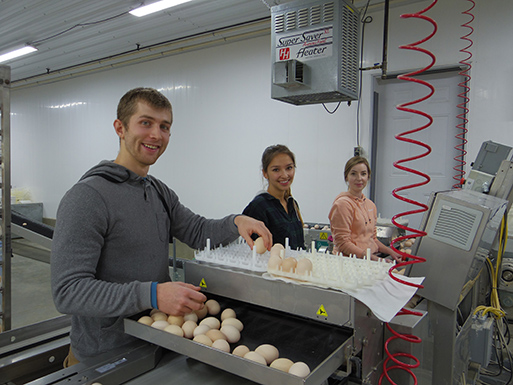
Rayden Saunders, Alyssa Chrapko and Erika Cornand completed their three-day mini-internship at Rietveld Poultry Farm, a broiler-breeder operation of 35,000 birds where they gained hands-on experience about the machinery, egg selection standards and how to inspect and maintain the flocks.
Day 1: Today we moved the broiler-breeders to their new housing area. We managed to move all the birds in a few hours, when it usually takes them two days! … (Then) we trained the chickens to use the new drinking system. That was a tough one as they seem to run in every direction except towards the water!
That exuberant email update is one of several from animal science student Jo Ann Chew, who spent three very full days during November's Reading Week knee-deep in chickens. The occasion was a new mini-internship program on a working farm, designed to immerse students in experience.
With the mini-internship "they get their hands dirty and feet dirty," said Frank Robinson, a professor of poultry production and physiology in the Department of Agricultural, Food and Nutritional Science. "They are actually doing the work. It's not a spectator sport."
Robinson launched the pilot project because the animal science program attracts a wide variety of students, including city kids and transferees from the science faculty, and many have zero experience on farms.
Most animal science students are familiar with companion animals and may be pondering the idea of becoming veterinarians, but ultimately only a few head that way, said Robinson. More typically, they opt for careers in the feed industry, go into food safety and security, work with commodity groups or find careers, like banking, where they deal with farmers.
Yet despite four half-day school labs held at different types of farms, few will graduate having actually worked with farm animals, said Robinson. So this mini-internship put students deep into the exhausting workday of a farmer, pitching in on whatever was needed.
The 15 students, who were deployed in small groups to either nearby commercial farms or one of the University of Alberta's operations on South Campus, performed such tasks as inseminating swine, milking cows and vaccinating birds. The farmers taught them their techniques and shared their real-world problems and solutions.
Rayden Saunders, Alyssa Chrapko and Erika Cornand interned at Rietveld Poultry Farm east of Sherwood Park, a broiler-breeder operation with some 35,000 birds that's owned and operated by Ashely and Ryan Rietveld. There they picked eggs, performed fertility testing and did barn-walks (walking through the barn several times a day to check on the birds.)
"I got to experience a wide variety of technical skills and see the challenges people in the industry face," said Saunders, adding that he learned about egg selection standards, the machinery and what's actually involved in inspecting and maintaining the flocks.
For Chrapko, who grew up in an urban home, the experience sparked a new interest in production animals and has motivated her to take classes about their health. Meanwhile, Cornand is taking up the Rietvelds' invitation to help with pullet vaccinations in mid-December, when she'll assist in carrying 10,000 birds to their vaccinations and then to a separate pen.
Even if those initially considering veterinary studies broaden their interest from companion animals to farm animals during university classes, without such up-close working experience it's very hard for students to find summer jobs on farms, said Robinson. So that's one obvious benefit of the project.
It may also shift their career paths, said Ashley Rietveld, who watched the lightbulb switch on for the students she hosted. "They were students from an urban population, and one comment I heard was that they didn't know there could be a poultry vet. They didn't know about the career opportunities specific to poultry."
For the farmers, all of whom patiently explained their work and directed the students to more resources for learning, there's also a significant long-term upside.
"The incentive is they can help build the next generation of people they're going to be working with," said Robinson. "They could be the people that sell them their feed, lend them the money to buy a farm, are specialists in research telling them how to manage their animals or advising on food safety and biosecurity, or they could even be the people who buy their farm from them."
For the next round of mini-internships during February's Reading Week, Robinson wants to involve 50 students, so he needs 20 to 25 participating farms operating beef, swine or poultry. Interested farmers can contact him at: frobinso@ualberta.ca.
Students keen to sign up will be interviewed in mid-January.